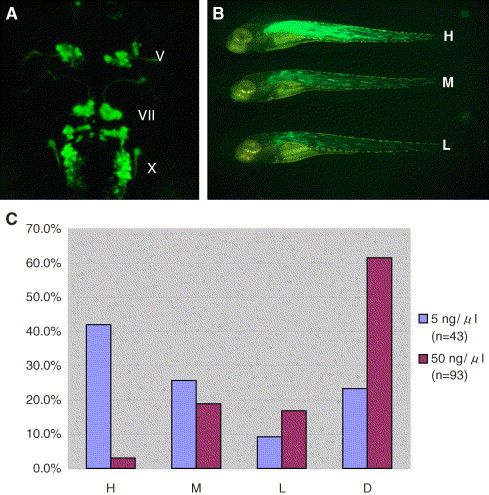Fig. 1 Effectiveness of transient transgene expression by injection of circular plasmid at a very low concentration. (A) Dorsal view of the 48-hpf embryo injected with the CM-isl1:GFP plasmid at a very low concentration. Note that most of the cranial motor neurons transiently expressed GFP at a level comparable to that of the embryo stably transgenic for the same DNA construct (Higashijima et al., 2000). V, trigeminal motor neurons; VII, facial motor neurons; X, vagus motor neurons. (B and C) The embryos injected with the α-actin:GFP plasmid were subdivided into four groups according to the degree of contribution of GFP-positive cells to the whole embryo, i.e., to groups H, M, and L, which represent embryos that express GFP in most muscles, scattered muscle cells plus some clusters of muscle cells, and in scattered separate muscle cells alone, respectively, and group D for dead embryos. (B) Representative embryos from each group are shown. Note that even in the embryo from group H, which expressed high levels of GFP in trunk muscles, craniofacial and fin muscles rarely expressed GFP. (C) The bar graph shows the percentage of embryos belonging to each group among all the embryos injected with the α-actin:GFP plasmid. Injection was performed at a concentration of 5 ng/μl (blue bar) or 50 ng/μl (red bar).
Reprinted from Developmental Biology, 278(2), Uemura, O., Okada, Y., Ando, H., Guedj, M., Higashijima, S., Shimazaki, T., Chino, N., Okano, H., and Okamoto, H., Comparative functional genomics revealed conservation and diversification of three enhancers of the isl1 gene for motor and sensory neuron-specific expression, 587-606, Copyright (2005) with permission from Elsevier. Full text @ Dev. Biol.

